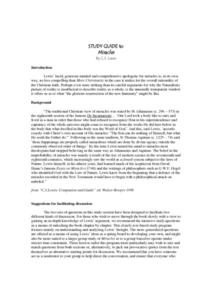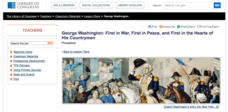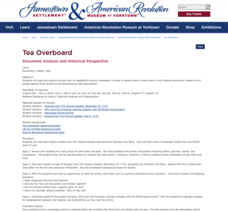Curated OER
Art Reflects Life
Fifth graders use the Internet to view collections of famous artists throughout the eighteenth century America. Using the artwork, they identify the themes that portrayed America as the land of opportunity. They record their findings...
Curated OER
Speaking in Grave Tones
Fourth graders examine how a change in attitudes about death took place from the late eighteenth to the early nineteenth century and was embodied in gravestones, literature, and art.
Curated OER
Worksheet #57 Questions- Citizen Jefferson
In this Thomas Jefferson quiz, students define the meaning of several terms to demonstrate their understanding of elements of this founding father's life.
Curated OER
The Opium Trade, the Opium War and the Treaty of Nanjing
Ninth graders analyze the English model if imperialism with regard to China and examine the economic and political impact of trade and conflict between England and China in the eighteenth and nineteenth centuries. They discuss the...
Curated OER
From Riches to Rice
Tenth graders identify and locate Africa, the United States, the Original 13 colonies, and the region of West Africa on a map. They list examples of culture and African American culture. Students link the culture of West Africa with the...
Curated OER
Mixing Races in New Orleans
Learners discuss the changes in the legal, social, and political status of African Americans and those of mixed ethnicity after reading the narrative, Haitian Immigration: Eighteenth and Nineteenth Centuries.
C.S. Lewis Foundation
Study Guide to Miracles
Teaching is challenging, so is proving through logic that miracles and divine intervention can happen in this world. It is even more arduous to teach the text of that proposition—good thing there are resources available, like this study...
Library of Congress
George Washington: First in War, First in Peace, and First in the Hearts of His Countrymen
Does the lens of history portray George Washington as a good leader? A three-lesson unit looks at Washington's early military career as the commander of the Virginia Regiment, his role in the fight for independence from England, and his...
Curated OER
Colonial New York Slave Codes: Pedro's Walk
Look critically at the slave laws instated in Colonial New York. Your class examines primary source documents, slave laws, a narrative account from a slave's perspective, and Slave Codes. They write diary or journal entries in response...
Curated OER
What Does It All Mean?
Learners investigate the symbolism and meaning of samplers in American history. In this American history and sampler lesson, students examine pictures of original samplers and look at lists of the symbolism included in them. They connect...
American Institute of Physics
African American Inventors in History
A two-part lesson introduces young historians to the work of famous African American inventors. Groups first research and develop a presentation of an inventor that includes biographical information and information about one of their...
Curated OER
Introduction to Age of Absolutism
Who were the absolute monarchs of Europe and what effect did they have on their countries? Young historians begin by naming qualities they believe are important for a monarch to possess. They then take notes on four key factors leading...
National Endowment for the Humanities
Lesson 1: The First Great Awakening
High schoolers examine the First Great Awakening and how it affected religious belief in colonial America. They read and analyze primary source documents, explore various websites, and write a five-paragraph essay examining the beliefs...
Curated OER
In Old Pompeii
Students investigate the history of Pompeii and its destruction. They take a virtual field trip to the ruins of Pompeii, create a travel brochure to attract tourists to the site, and write an account of their trip.
Curated OER
If Paintings Could Talk: Art and Language
Middle schoolers learn about the artist Canaletto, play a vocabulary game, and create a landscape using collage technique. Background information on the artist is provided along with instructions for the game and vocabulary words to...
Curated OER
Poe's Short Stories by Edgar Allan Poe
High schoolers respond to 15 questions about short stories by Edgar Allan Poe and his works. Using the Cliffs Notes website they may also link to an online interactive quiz on the stories at the bottom of the page.
Curated OER
The Worldly Philosophers by Robert Louis Heilbroner
In this online interactive reading comprehension worksheet, students respond to 15 multiple choice questions based on The Worldly Philosophers. Students may submit their answers to be scored.
National Endowment for the Humanities
Lesson 1: The United States Confronts Great Britain, 1793–1796
After the Revolutionary War, the success of the United States was far from guaranteed. Foreign powers coveted the new land, and Great Britain challenged American sovereignty. Learners consider the challenges facing the new nation using...
Curated OER
Romanticism 1800-1860
What do Roger Chillingworth, Dr. Heidegger, and Ethan Brand have in common? They are all American literature poster boys for Romanticism, advertising the dangers of valuing reason over feeling and intuition. Introduce your class to...
Elizabeth Murray Project
The Education of Women in Colonial America
What educational opportunities were available to women during the colonial era in American history? How did the opportunities available to women differ from those for men? To answer this question, class members examine a series of...
National Institute of Open Schooling
Coordination Compounds
Cyanide, a coordination compound, is used in the extraction of gold and silver. Part 24 in the series of 36 delves into the world of coordination compounds. Classes learn, through readings, discussions, and answering questions, how to...
Jamestown-Yorktown Foundation
Tea Overboard
While less well known than the event in Boston, the Yorktown Tea Party was equally decisive in turning community sentiment against Great Britain. To gain an understanding of why the colonists objected to the Tea Act, young historians...
Jamestown-Yorktown Foundation
How Do We Know about Colonial Life?
Young history sleuths examine an inventory of the belongings of a Virginia colonist and use deductive reasoning to determine what the document reveals about colonial life. They then use a Venn diagram to compare the inventory with a...
Curated OER
Poetry: "The Poplar Field" by William Cowper
Explore poetry analysis. Learners read the poem "The Poplar Field" by William Cowper, answer a series of questions, and discuss literary devices. It is a terrific way to help your class understand how to read and understand poetry.

























